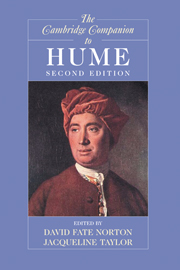Book contents
- Frontmatter
- 1 An Introduction to Hume’s Thought
- 2 Hume’s New Science of the Mind
- 3 Hume and the Mechanics of Mind: Impressions, Ideas, and Association
- 4 Hume’s Theory of Space and Time in Its Skeptical Context
- 5 Hume on Causation
- 6 Hume and the Problem of Personal Identity
- 7 Hume’s Skepticism
- 8 Hume’s Moral Psychology
- 9 The Foundations of Morality in Hume’s Treatise
- 10 Hume’s Later Moral Philosophy
- 11 The Structure of Hume’s Political Theory
- 12 Hume’s Principles of Political Economy
- 13 Hume on the Arts and “The Standard of Taste”: Texts and Contexts
- 14 David Hume: “The Historian”
- 15 Hume on Religion
- Appendix: Hume’s Autobiographies
- Selected Bibliography
- Index
- Series List
8 - Hume’s Moral Psychology
Published online by Cambridge University Press: 28 May 2009
- Frontmatter
- 1 An Introduction to Hume’s Thought
- 2 Hume’s New Science of the Mind
- 3 Hume and the Mechanics of Mind: Impressions, Ideas, and Association
- 4 Hume’s Theory of Space and Time in Its Skeptical Context
- 5 Hume on Causation
- 6 Hume and the Problem of Personal Identity
- 7 Hume’s Skepticism
- 8 Hume’s Moral Psychology
- 9 The Foundations of Morality in Hume’s Treatise
- 10 Hume’s Later Moral Philosophy
- 11 The Structure of Hume’s Political Theory
- 12 Hume’s Principles of Political Economy
- 13 Hume on the Arts and “The Standard of Taste”: Texts and Contexts
- 14 David Hume: “The Historian”
- 15 Hume on Religion
- Appendix: Hume’s Autobiographies
- Selected Bibliography
- Index
- Series List
Summary
In 1927 A. E. Taylor concluded his Leslie Stephen Lecture on “David Hume and the Miraculous” with a judgment of Hume's attitude to his philosophical work that has been held by many other readers of Hume:
What kind of response one makes to life will, no doubt, for better or worse, depend on the sort of man one is for good or bad. . . . But we can all make it our purpose that our philosophy, if we have one, shall be no mere affair of surface opinions, but the genuine expression of a whole personality. Because I can never feel that Hume's own philosophy was that, I have to own to a haunting uncertainty whether Hume was really a great philosopher, or only a “very clever man.
Taylor is here expressing an attitude to Hume that many of us have felt: that his philosophy does not deserve to be taken too much to heart, because for all his intellectual vitality and the disturbing character of much that he says, there is a streak of frivolity in him that leads him to follow arguments to outrageous conclusions without serious consideration of the effect such conclusions may have on those who are driven to them; and that the love of literary reputation that he openly expressed was of far greater personal importance to him than philosophical truth.
- Type
- Chapter
- Information
- The Cambridge Companion to Hume , pp. 238 - 269Publisher: Cambridge University PressPrint publication year: 2008
- 1
- Cited by

